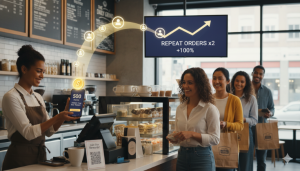The internet has changed the way we do business, especially when it comes to restaurants. With more and more customers turning to the internet to find new places to dine, it has become imperative for restaurants to establish an online presence. One of the most vital components of any online presence is search engine optimization (SEO). From keyword research to online reputation management, many aspects of SEO can help restaurants stand out in the crowded online space. But what is SEO, and how does it help restaurants increase traffic? In this blog post, we will explore the science behind search, the role of keywords in algorithms, and how they help restaurants increase their online visibility.
Understanding The Role Of SEO
SEO is optimizing a website to rank higher on search engine results pages (SERP). It involves techniques such as keyword research, on-page optimization, link building, and content creation. The ultimate goal of SEO is to drive organic traffic to a website. In simple terms, the higher a website ranks on a search engine, the more likely it is to get clicked by users. That’s why SEO has become an integral part of any online marketing strategy. SEO is just one aspect of developing an online reputation. By using online reputation management tools, restaurants can better understand how they are perceived online and take steps to improve their reputation. With the right tools and tactics, restaurants can attract new customers and build a loyal following through their online presence.
How Keywords Help Restaurants Increase Traffic
The key to success for a restaurant is to stand out from the competition and attract more customers. And that’s where keywords come in. Keywords are the words and phrases users type into a search engine when looking for something online. By optimizing their website with relevant keywords, restaurants can increase their online visibility and attract more customers.
For example, if a restaurant in New York City wants to attract more customers, they might want to optimize their website for the keyword “best Italian restaurant in NYC.” By doing so, they can increase their chances of showing up on the first page of Google when someone searches for the best Italian restaurant in NYC. And the higher they rank, the more likely people will visit their website and restaurant.
How Algorithms Work
Search engine algorithms are the complex mathematical equations that determine the relevance of a website to a search query. They consider numerous factors, such as keywords, backlinks, website structure, and content quality, to determine page rankings on SERPs. However, search engines like Google are constantly updating their algorithms to provide the best possible results to users.
Restaurants must stay updated on SEO trends to rank high on SERPs. Google’s latest algorithm update prioritizes mobile-friendliness. Thus, optimizing websites for mobile devices is crucial. Reputation management is also important. When ranking pages on SERPs, search engines consider online reputation, including customer reviews and social media presence.
Best Practices For Restaurants To Optimize Keywords
Now that we know the importance of keywords in SEO let’s take a look at some best practices that restaurants can use to optimize keywords:
- Conduct keyword research to identify the most relevant keywords for your target audience.
- Optimize your website content with relevant keywords, including meta descriptions and titles.
- Use location-specific keywords to target local customers.
- Keep your website updated with fresh and relevant content to improve search engine rankings.
- Make sure your website is mobile-friendly to rank high on SERPs.
Final Thoughts
In conclusion, SEO is crucial to a restaurant’s online visibility and traffic. By optimizing their website with relevant keywords and staying up-to-date with the latest trends in SEO, restaurants can increase their chances of standing out in the digital landscape and attracting more customers. Therefore, restaurants must invest time and resources into SEO to stay ahead of the competition. By doing so, they can reap the rewards of increased online traffic and ultimately drive more customers to their restaurant.







